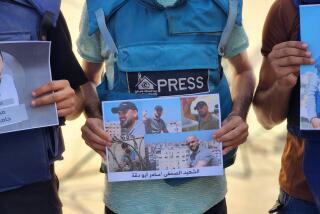Palestinians Are Trapped by Their Own Culture
Tuesday’s simultaneous bus bombings in Israel, carried out at a time when the Sharon government insists on withdrawing from Gaza, raises a basic question: Why is peaceful coexistence taking so long in the Holy Land? It’s because there isn’t only one occupation of the Palestinian territories. There are two.
The first is a military occupation by the Israel Defense Forces, and the distress that it’s inflicting can’t be denied. Neither can the resentment fueled by Israel’s security barrier, a combination of fences and walls that turns some Arab villages into holding pens.
But in the spirit of honesty, liberals like me need to deal with a second occupation -- the ideological occupation of the Palestinian people by their own leadership, their own culture. Over the last six decades, several offers for an independent state of Palestine have been floated by the British, the Israelis, the Americans and the U.N. -- Palestinian leaders have rejected every proposal. Worse, they have never consulted the Palestinian people before saying no.
Which brings me to the bigger problem of Palestinian culture -- a popular culture of incitement that doesn’t exist in Israel. Already I can hear the cries of “racism!” As a Muslim woman, however, I don’t feel the need to toe any tribal line. I also don’t give up hope, for cultures can and do evolve; they are, after all, the handiwork of human beings, not of God. To question a particular aspect of Palestinian culture, then, is nothing more than an expression of faith that more humane choices can be made.
Let me illustrate. In June 2003, a survey by the Pew Research Center for the People and the Press found that most Palestinians could not envision a way for their rights to be protected as long as Israel existed. By contrast, the survey found that, among Arab citizens of Israel, a solid majority felt the opposite. Of the Arab Israelis surveyed, 62% said it would be possible for both groups to have their rights protected. What accounts for this difference in attitude?
Posters of shaheeds -- martyrs -- plaster the buildings of the West Bank and Gaza. Billboards proclaim their undying honor. Adolescents make up rap tunes to them while expressing hope that one day they will imitate the self-immolators. Even a soccer tournament on Palestinian Children’s Day is named for a suicide bomber.
I’m not implying that Israeli government policies are blameless. Far from it. For example, the government of Prime Minister Ariel Sharon refuses to arrest the criminals who set up illegal outposts in the West Bank. Such willful negligence will only feed extremism on both sides.
But let’s not lose sight of the larger reality. After the Aqaba peace summit in June 2003, both the Israeli and Palestinian prime ministers encountered protests. Hard-line Israelis resorted to demonstrating and jeering. Hard-line Palestinians resorted to blowing up buses and the people in them. That’s a life-and-death difference in choices.
Many of my fellow liberals would argue that choices don’t exist for Palestinians -- they’re economically impoverished and desperate. Not according to Mohammed Hindi, the top Gaza leader of Islamic Jihad. His response was part of a longer interview I conducted with him in Gaza -- on camera and before the construction of Israel’s security barrier.
“What’s the difference,” I asked, “between ‘suicide’ and ‘martyrdom,’ as you folks now call it?”
“Suicide,” he replied, “is done out of despair. But most of our martyrs were very successful in their earthly lives.”
Hindi’s answer floored me. By his own admission, what drives so many of today’s suicide bombers isn’t that which the material world has failed to deliver to them, but something besides -- perhaps the Koran’s promises for the afterlife or, perhaps more precisely, Palestinian culture’s ideological exploitation of the Koran’s promise of paradise.
This much is clear: We liberals need to be asking as many tough questions of Palestinian officials as of Israeli ones. Until we do, we’ll always reduce Palestinians to the status of mere victims. And that does nothing to recognize their dignity. Or their capacity for making ethically -- and ideologically -- sounder choices.
*
Irshad Manji is host of TV Ontario’s “Big Ideas” and the author of “The Trouble With Islam: A Muslim’s Call for Reform in Her Faith” (St. Martin’s Press, 2004).
More to Read
Sign up for Essential California
The most important California stories and recommendations in your inbox every morning.
You may occasionally receive promotional content from the Los Angeles Times.










